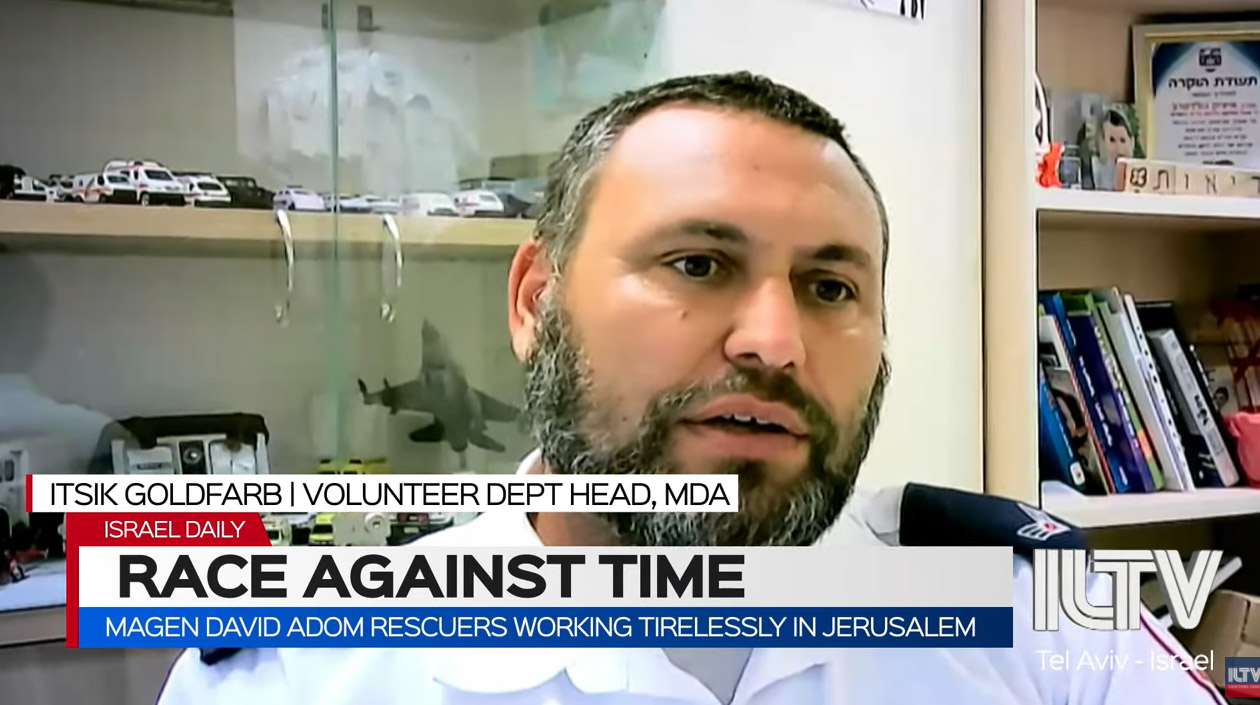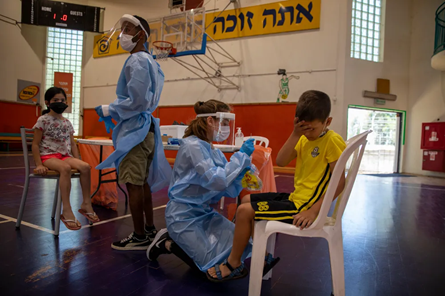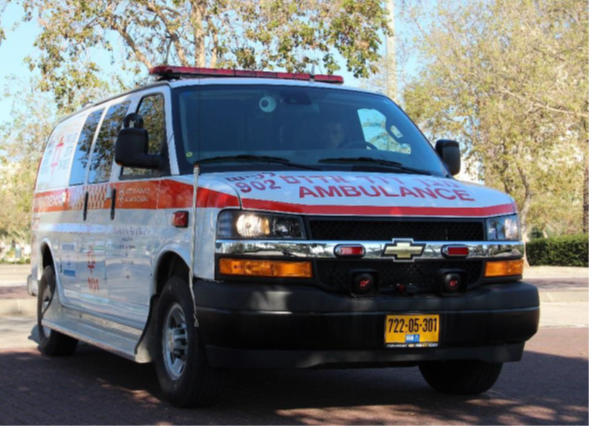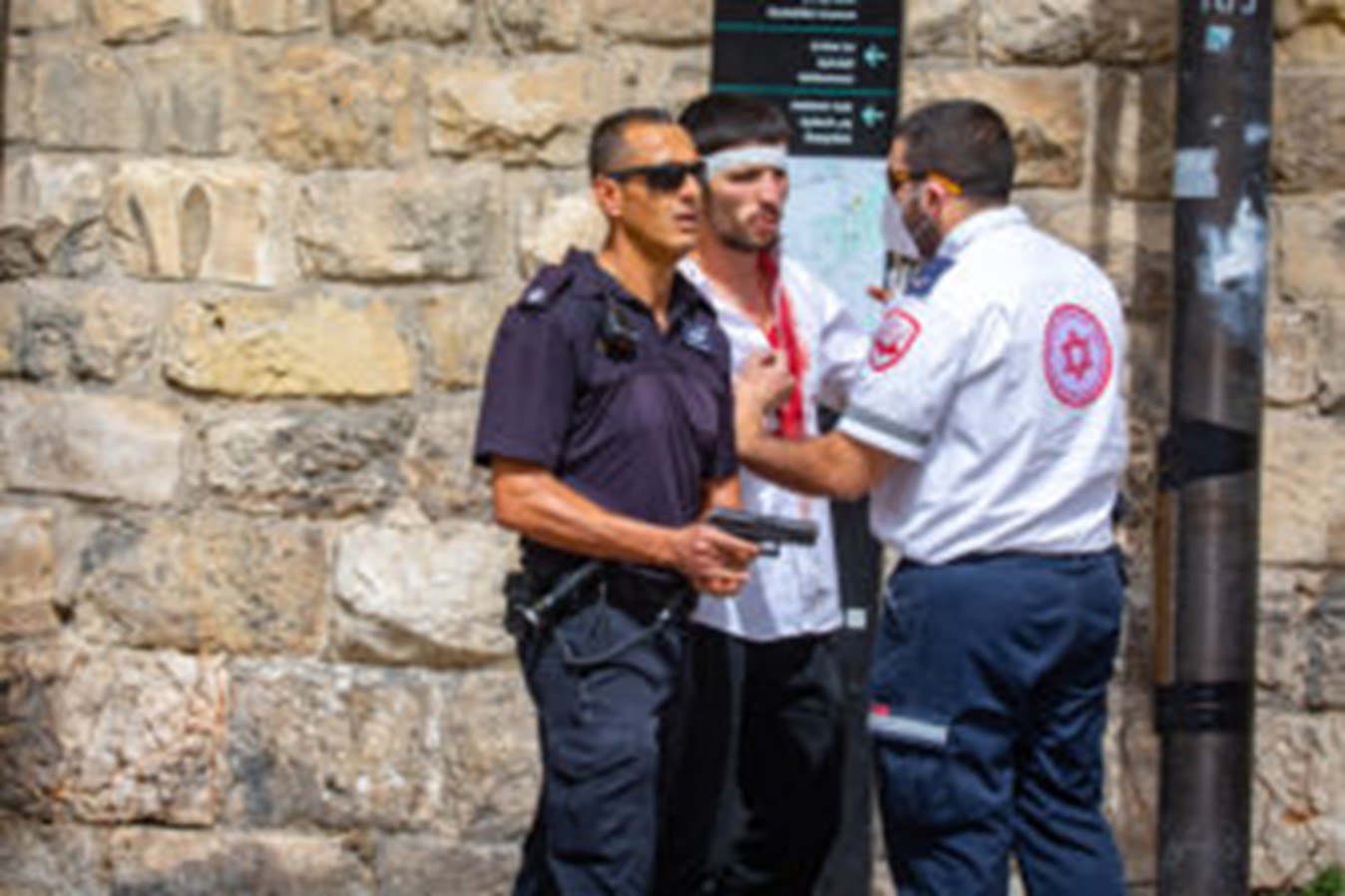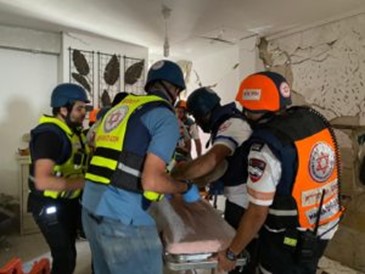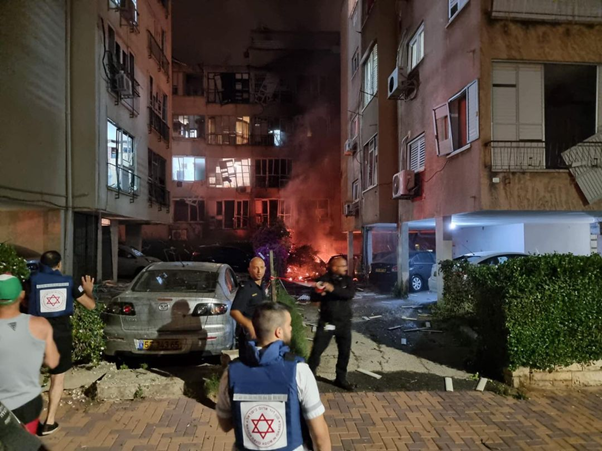ILTV — Itsik Goldfarb, head of the volunteer department for Magen David Adom, discusses MDA’s preparations, evacuations, and training for the massive wildfires in the Jerusalem Forest that destroyed some 6,200 acres between Sunday and Tuesday. More than 2,000 people were evacuated from their homes. Thankfully, casualties were minimal.
Magen David Adom to open 220 rapid-testing centres amid new restrictions
The Government is still debating restrictions on outdoor restaurant seating and pools ahead of implementation.
Magen David Adom is set to open some 220 antigen test centers around Israel on Wednesday as new restrictions come into force to combat rising cases of COVID-19.
The government is attempting to prevent a potential lockdown during the High Holidays in September, as the number of seriously ill patients stands at more than 550. The number of new daily cases broke 8,000 Tuesday, the highest since February.
The “purple badge” designation for malls, stores, commercial and shopping centers, and venues holding audiences will be limited to one person per seven square meters.
The status of swimming pools, seating in outdoor restaurants and other attractions have not been decided.
Cultural and sporting events, conferences, exhibits, gyms, studios, houses of prayer of more than 50 people, festivals, and more require a “green pass” given to those vaccinated or recovered from coronavirus.
Those under three are exempt from testing, while those three to 12 can receive free testing to enter places with “green pass” restrictions. Those over 12 will have to pay for the test.
Rapid antigen tests are good for 24 hours, while the more reliable PCR tests last for three days.
MDA ANNUAL CAMPAIGN 2021: AMBULANCES SAVE LIVES. PLEASE HELP US!
This year’s Annual Campaign is aimed at raising funds to replace the 12 ambulances which were damaged and destroyed in the recent conflict in Israel.
MDA Israel has asked for funds to be raised urgently to replace the ambulances damaged during the recent Guardian of the Walls campaign when twelve ambulances were damaged during recent riots in Arab/Jewish towns.
Additionally, each year, due to significant wear and tear, Magen David Adom needs to replenish its fleet of ambulances with approximately 120 new vehicles. This was especially true in the past two years, with an unprecedented number of calls on MDA ambulances during COVID-19. MDA ambulances are in service on average for 7-10 years with a 10-year limitation as directed by the Ministry of Transportation. MDA ambulances are on call 24/7 and in certain major cities can treat as many as 9,000 patients per year in their lifetime of service.
The MDA Life Support Ambulance is an integral part of the organization’s ability to provide emergency lifesaving services. The ambulances are fully equipped with an array of medical equipment and staffed by a professional Emergency Medical Technician (EMT) acting as a driver-medic and volunteer medics and can treat a wide range of patients from traffic accident victims, different types of trauma, resuscitations, births, etc.
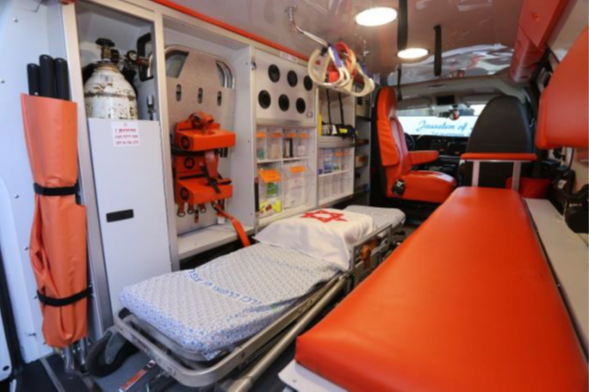
As an NGO and a non-profit organization MDA does not receive any funding from the State of Israel and all of its emergency vehicles, including its ambulances, are donated by generous donors from around the world. Thanks to these generous acts of philanthropy, the organisation is able to continue its lifesaving work in all parts of Israel assisting anyone and everyone in need!
For a confidential discussion regarding your donation, please contact Rivkah Lazarus on 9358 2521 or Rivkah@magendavidadom.org.au
MDA’s New Wish Ambulance Launched on a Special Voyage
7-year-old Rafael Yotam fulfilled his dream of becoming a captain on a navy ship.
About four years ago, Rafael Yotam Cohen, who has cancer, fulfilled a dream using an MDA Wish Ambulance – and flew in an MDA-Lahak emergency helicopter in the southern skies of the country. Recently, Rafael Yotam’s rare illness returned for the third time and to put a smile on his face – MDA enlisted and fulfilled another dream of sailing a Navy ship on a day full of experiences and dreams come true.
The Magen David Adom Wish Ambulance project began volunteering in 2009 and to this day has managed to fulfill the wishes of thousands of critically ill patients. A new and special ambulance has been launched these days, donated through the MDA Friends Society in Melbourne, Australia, headed by Ms. Glynis Lipson. Rafael Yotam’s wish was the first to be fulfilled through the new vehicle.
The fulfillment of Rafael Yotam’s first wish about 4 years ago had a positive effect on his medical condition, which improved immediately afterwards. Rafael Yotam’s mother, Ravit Cohen, decided to take an active part in the fundraising campaign for a new ambulance and even participated in a campaign in Australia.
The Cohen family contacted MDA and told about the dream – and the organization immediately joined the mission and worked to make it come true.. About a week ago, Rafael Yotam (7.5), a resident of Neta in the Lachish region, the youngest of seven brothers and sisters in his family, fulfilled his dream. He arrived by MDA’s new Wish Ambulance at the naval base in Ashdod, where officers and fighters of the Navy’s Shaldag ship were waiting for him with excitement and special refreshments and surprises. As part of the special day, Rafael Yotam met the soldiers and officers of the navy, received an explanation about the ship and the weapons placed in it and even set sail while sitting in the captain’s chair and holding the rudder.
The ambulance includes full intensive care mobile equipment, the first and only electric bed of its kind in Israel adapted for critically ill patients, a special place for attendants and even a special medicine refrigerator. The compartments in the ambulance are hidden, in order to reduce the level of stress among the passengers and simulate normal driving conditions. The ambulance includes a place for the driver, two staff members, a patient and three accompanying family members.
The first wish in the new ambulance was accompanied by paramedics Tomer Bar-Levi and Shachar Hezkelevich and the paramedic Yonat Daskal-Dagan who accompanied Rafael Yotam also on his first wish: “I am doubly excited – both from the fulfillment of Rafael Yotam’s wish and the launch of the new ambulance. ” When we set out on a journey in Australia, Yotam recovered after the first wish, we were very saddened to hear that he was ill again. We created a special day in order to put a smile on his face, at least for a few moments. I thank the Navy for enlisting in the special mission and we wish him complete recovery and full health.”
The captain of the ship, Captain Peleg, who hosted with his soldiers, wished Rafael Yotam health and said: “We are very, very excited and happy that you came to sail with us. Thanks to children like you and your family we do what we do, you give us the strength to keep going, thank you very much.”
Ravit Cohen, Rafael Yotam’s mother, said: “Already at the fulfillment of the first wish, we became very connected to the MDA family and the staff of the Wishes ambulance – and we remained in close contact. After Rafael Yotam recovered, I flew to Australia to promote donations to MDA’s new ambulance and to my delight the donations were successfully raised. We asked him what he would like to do and he answered – to sail a ship. “MDA immediately organized the special day with the Navy, which was charming and extraordinary. The experience was amazing – the soldiers hugged us and were cordial and prepared special gifts for Rafael Yotam. He was happy and excited, and told everyone who het met about the past experience.”
On the fulfillment of the special dream, Rafael Yotam concluded: “I had a lot of fun and I want to be a captain now. I wander around the house all day with the flag I received from the soldiers, like Superman. Thank you all.”
An MDA Lottery Booth Defibrillator Saves the Life of a 40-Year-Old Man in the Carmel Market
Last week, a man collapsed in the Carmel Market in Tel Aviv. MDA’s 101 emergency call center was immediately contacted and began the process of saving his life with the help of an emergency defibrillator stored on the side of a Mifal HaPais lottery booth.
After emergency call center EMT, Yuval Kadishi, realized that the man had gone into cardiac arrest, she identified (on MDA Command and Control System) a nearby MDA public domain defibrillator placed on a lottery booth, held for dire situations such as this one. Kadishi remotely unlocked the defibrillator box and instructed the caller to retrieve the AED and bring it to the patient’s location. While the caller did so, Kadishi launched nearby MDA first responders and a Mobile Intensive Care Unit. She remained on the line and MDA EMT Zeev Fishman who had been shopping in the market arrived at the scene.
After the resuscitation, Fishman said:
“While shopping with my wife and child at the market, I got a call on MDA’s first responders app about a man who collapsed nearby. I immediately ran to the scene, they signalled me to get to one of the stalls where a 43-year-old man was lying unconscious with no pulse and not breathing. With the help of the people who were there, and within 2 minutes, they brought me the MDA public domain defibrillator that had been installed recently, with the help of the Mifal HaPais Lottery, on their booth, on a nearby street. I connected the AED to the patient; it gave several electric shocks and immediately afterwards his heart began to beat again. The man woke up and wondered what was going on around him and asked to remove the oxygen mask from his face. MDA’s MICU team continued with medical treatment and evacuated the patient to the ICCU in Ichilov Hospital in stable condition.”
“Once again, it has been proven how important the defibrillator devices connected to the MDA hotline are accessible to anyone in the public space. There is no doubt that the availability of the device significantly helped save the life of the man who collapsed,” said EMT Yuval Kadishi.
New technology automatically alerts MDA when a vehicle is in an accident
An Israeli insurance company is capitalizing on technology developed by Magen David Adom and Israeli tech startup MDGo that will automatically notify MDA when vehicles owned by the insurer’s clients are involved in accidents.
The insurance company, Direct Insurance, and MDA both see the technology as a potential lifesaver, saving crucial minutes by instantly notifying the EMS organization of car crashes, an important consideration when drivers are rendered unconscious in the crash and are unable to call for medical help themselves.
Even when serious auto accidents are witnessed by passersby, there’s a period of confusion and people assessing their own injuries in which as much as five minutes typically elapses before someone has the presence of mind to call for an ambulance. MDGo and MDA’s technology will eliminate that issue.
The technology not only informs MDA and Direct Insurance about the location of the crash, but accurately predicts the nature of the passengers’ injuries based on impact and vector data. As a result, paramedics and EMTs are not only arriving faster, but better informed about the treatment they’ll need to administer at the scene.
“Based on the vehicular impact, [our technology] alerts arriving EMTs and the hospital to injuries the patient may have sustained, but which may not be immediately apparent,” says Itay Bengad, MDGo’s co-founder and CEO. “This enables earlier interventions and prevents potentially fatal complications that can result from leaving undetected injuries unaddressed for hours — or even days.”
MDGo developed its crash-detection technology using Magen David Adom’s own cutting-edge capabilities, including MDA’s ability to instantly geolocate cellular phone callers. “Because we’ve developed almost all our [EMS] apps ourselves, we’ve become an incubator for startups,” says Ido Rosenblat, chief information officer for MDA. “The result is that MDGo and MDA are working to save lives together.”
Facebook Israel launches blood donation locator feature
Facebook users will now be able to sign up for real-time alerts at blood donation centres in their area and set up routine reminders to donate blood.
Facebook Israel CEO Adi Soffer-Teeni visited Magen David Adom National Headquarters in Kiryat Ono on Monday as part of the launch of a new feature that will be integrated into Facebook to help raise awareness of the importance of blood donations in Israel and feature the locations of MDA’s blood donation services throughout the country.
With the new feature, Facebook users will be able to sign up for real-time alerts at blood donation centres in their area, set up routine reminders to donate blood and invite family and friends to donate blood themselves.
According to a statement from MDA, more than 100 million people worldwide have signed up to receive blood donation alerts in their areas and use the feature to donate blood on a regular basis.
Magen David Adom states that in order to meet the needs of the Israeli health system in order to treat those who need a blood transfusion to save their lives, MDA’s blood services are required to donate 1,000 doses of blood every day.
During the visit, MDA CEO Eli Bin explained to Soffer-Teeni the variety of technological means currently integrated into MDA’s systems and introduced her to technologies which already integrate Facebook into MDA’s control systems – such as a features which allow people to start direct WhatsApp chats with an EMT or paramedic, send their location, send photos and more.
Soffer-Teeni said in a statement that “Recent events in Israel have once again shown Israeli solidarity at its best.”
She recalled the way thousands of Israelis stepped up to donate blood after 45 people were crushed to death in the Mount Meron Disaster, saying “When MDA called on the public to come and donate blood after the disaster in Meron, we witnessed a rapid and exciting mobilization that proved the power of a community.”
“However, the need for blood donations continues all the time and the blood bank needs a daily supply of blood units to save lives,” she said. “Using this new tool, we at Facebook strive to make blood donation a simple and accessible task, thus raising awareness of the importance of these donations. Together we will save the lives of other Israelis.”
Bin said MDA were especially “excited” to launch Facebook’s “welcome initiative” on June fourteenth, World Blood Donor Day.
He said that thanks to the new feature, MDA “will be able to reach a wider audience and significantly increase the number of volunteer blood donors in Israel.”
“This is an important national mission that will raise awareness of blood donations and make the location of MDA’s blood donation centres accessible across the country. It is an algorithm that can, literally, save lives,” he added.
Which Israeli city donates the most blood?
International Blood Donor Day at MDA: How many blood units have been donated this year? Which city is at the top of the list?
Monday marks the International Blood Donor Day in Israel and around the world, and according to Magen David Adom (MDA) blood services data, 271,305 blood units were donated since the last Blood Donor Day, 48,447 of which were from new donors who donated blood for the first time this year.
International Blood Donor Day is celebrated every year on June 14 in order to raise awareness of blood donations and to mark the birthday of Dr. Karl Landsteiner, an Austrian physician and biologist who discovered the existence of various blood types in 1900. This fact now allows blood transfusions to be given to patients who need this treatment to save their lives.
According to MDA blood services data, during the past year (to date), 271,305 blood units were donated in Israel that helped save the lives of about 800,000 sick, injured and mothers in the country. Of those, 68.5% of blood donations were donated by men (185,739) and 31.5% by women (85,566). The data published by MDA also shows that IDF soldiers donated 68,875 blood units, which is a quarter of all blood units donated in Israel in the past year. A full 17% of all blood donors (48,447) donated blood this year for the first time in their lives.
The ten cities that have donated the largest amounts of blood are (ranked from highest to lowest) are Jerusalem, topping the list with with 17,096 blood units (6% of all donations in the country), 11,861 of them from men and 5,235 from women.
Second in line is Haifa, with 13,619 blood donations, or 5% of all donations in the country; 8,913 of the donors were men and 4,706 were women. Tel Aviv is in third place with 10,601 blood units, which is 3.9% of all blood units donated in the country; 6,887 of the donors in the city were men, and 3,714 were women. Petah Tikva donated 6,732 blood units by 4,776 men and 1,956 women.
The capital of the Negev, Be’er Sheva, is in fifth place with 5,941 donations of blood units, of which 4,012 were donated by men and 1,929 by women. Modiin-Maccabim-Reut recorded 5,804 donations of blood units; 3,858 of the donors were men and 1,946 women. The city of Rishon Lezion is ranked seventh, with 5,656 blood units donated by 3,741 men and 1,915 women. In Ashdod, 4,847 blood donations were donated, with 3,203 of the donors being men and 1,644 women. In Netanya, 4,553 blood donations were donated; 3,155 of the donors were men and 1,398 were women. In Ramat Gan, which is in tenth place in the donor cities index, 4,248 blood donations were made by 2,776 men and 1,472 women.
MDA Blood Services called on the public to come and donate every day in general and on International Blood Donor Day in particular, with the main donation centers on the festive day located in the Rishon Lezion Municipality building at 20 Carmel Street between 4:00p.m. and 10:30p.m., and in Rabin Square in Tel Aviv between 3:30p.m. and 10:00p.m.
In addition to donating 271,305 blood units, MDA blood services teams collected 23,619 units of which 6,890 doses were given to 3,445 Corona patients in moderate and severe condition (two doses per patient).
The director of the MDA’s national blood donation department, Lior Altman: “Thanks to the generosity of the residents of the State of Israel, the citizens and the soldiers, we are able to reach the required target during the year to provide the blood units to the sick and injured. We thank the many donors who took their time and came to donate.”
“Every three months, blood can be donated, and we invite the public to continue this important life-saving mission.”
MDA’s Deputy Director General – Blood Services, Prof. Eilat Shinar, said: “Today we mark International Blood Donor Day following the important discovery of blood types by Dr. Karl Landsteiner more than 120 years ago, which is still in use today.”
“It is important to remember that in order to meet the needs of the health system and in order to treat those who need a blood transfusion to save their lives, MDA blood services are required to donate 1,000 blood units each day. To improve the specificity of the test, a new, modern, and more accurate system was added this year that allows the identification of diseases that may be transmitted by blood transfusions, such as viral hepatitis and AIDS, and a more specific detection of virus carriers.
“MDA’s blood services will move during the year to their new home in Ramle, to the world’s first blood bank building built underground and protected against conventional and unconventional threats. The new blood bank will contain state-of-the-art equipment from the world’s leading technologies.
“MDA’s blood services thank all the blood donors and those who recovered from corona and came to donate plasma that made it possible to treat patients with coronary heart disease.”
MDA Director General Eli Bin said: “In many cases, a life-saving operation involves blood transfusions that come from the donor’s arm through Magen David Adom’s blood services to the patient, and thus assist in critical medical care. With the help of hundreds of thousands of donors each year, this important life-saving mission is possible and helps the sick, injured, and mothers throughout the country. We thank the citizens of Israel who donate, time and time again, for the highest value of giving…and volunteer for the benefit of all residents of the State of Israel.”
With new at-home paramedic service, Israel’s national ambulance service becomes telemedicine pioneer
JERUSALEM – The elderly grandmother had a fever and felt weak, despite the antibiotics her family doctor had prescribed a couple of days earlier for a urinary tract infection. Instead of feeling better, she was getting worse.
That’s when her worried family made an urgent call to Magen David Adom – Israel’s national emergency medical service — so she could receive prompt medical attention and be transported to the hospital for treatment.
When MDA’s emergency medical personnel arrived at the woman’s apartment, however, her home became a makeshift medical clinic. One EMT accessed her medical history and the medications she was taking on the tablet he carried. Another checked the woman’s vitals and examined her for obvious signs of pain or infection.
To the surprise of the woman’s family, the first responders then video-chatted with a physician trained to work with MDA paramedics and EMTs. Under the physician’s guidance, they performed a series of tests, including an electrocardiogram and a urine test — the latter to determine whether the patient still had an infection.
Using telemedicine technology, the paramedics transmitted the test results to the doctor. He, along with the first responders, concluded that the woman was in good health overall but that the antibiotic she had been prescribed earlier wasn’t working.
“Instead of ordering her to the hospital, the physician prescribed a stronger antibiotic and sent the order electronically to her local pharmacy for her family to retrieve,” said Anat Gilgal, MDA’s paramedic supervisor for Israel’s central Sharon region. “Furthermore, the woman’s family doctor received all the information we collected during the house call, so he can provide follow-up care.”
Most importantly, Gilgal said, “she was able to stay home, in the comfort of her home, instead of the hospital’s emergency department.”
The encounter is emblematic of a cutting-edge, pilot telemedicine program Magen David Adom launched in October. The Community Medicine Initiative is significantly reducing the number of patients sent to the country’s overcrowded hospital emergency rooms.
In one review of some 1,000 patients who called for an ambulance, 70% were deemed well enough to be treated by health care professionals outside a hospital setting. (As Israel’s national ambulance service, Magen David Adom handles all calls for ambulances received at the national emergency hotline, 101.)
Prior to the pilot program, every one of those patients would have been transported to the hospital unless they refused transport.
The pilot, which is being funded in part by Israel’s Health Ministry, is serving the Yarkon and Sharon regions of central Israel. All the patients are members of Maccabi, the second largest of Israel’s four national HMOs.
Starting in mid-June, Magen David Adom will significantly ratchet up the program, expanding it to Israel’s entire central region and Jerusalem. “This will free up innumerable hospital beds and ambulances for other Israelis who need them and save the government and health care system millions of shekels,” said MDA’s chief of staff, Uri Shaham. “It will also keep many patients at home where they’re most comfortable recuperating, and ultimately provide better medical care for thousands of Israelis.”

<!– /* Font Definitions */ @font-face {font-family:”Cambria Math”; panose-1:2 4 5 3 5 4 6 3 2 4; mso-font-charset:0; mso-generic-font-family:roman; mso-font-pitch:variable; mso-font-signature:-536869121 1107305727 33554432 0 415 0;} @font-face {font-family:Calibri; panose-1:2 15 5 2 2 2 4 3 2 4; mso-font-charset:0; mso-generic-font-family:swiss; mso-font-pitch:variable; mso-font-signature:-469750017 -1073732485 9 0 511 0;} @font-face {font-family:Roboto; panose-1:2 0 0 0 0 0 0 0 0 0; mso-font-charset:0; mso-generic-font-family:auto; mso-font-pitch:variable; mso-font-signature:-536868097 1342185855 33 0 415 0;} /* Style Definitions */ p.MsoNormal, li.MsoNormal, div.MsoNormal {mso-style-unhide:no; mso-style-qformat:yes; mso-style-parent:””; margin-top:0cm; margin-right:0cm; margin-bottom:8.0pt; margin-left:0cm; line-height:107%; mso-pagination:widow-orphan; font-size:11.0pt; font-family:”Calibri”,sans-serif; mso-ascii-font-family:Calibri; mso-ascii-theme-font:minor-latin; mso-fareast-font-family:Calibri; mso-fareast-theme-font:minor-latin; mso-hansi-font-family:Calibri; mso-hansi-theme-font:minor-latin; mso-bidi-font-family:”Times New Roman”; mso-bidi-theme-font:minor-bidi; mso-ansi-language:EN-AU; mso-fareast-language:EN-US;} .MsoChpDefault {mso-style-type:export-only; mso-default-props:yes; font-family:”Calibri”,sans-serif; mso-ascii-font-family:Calibri; mso-ascii-theme-font:minor-latin; mso-fareast-font-family:Calibri; mso-fareast-theme-font:minor-latin; mso-hansi-font-family:Calibri; mso-hansi-theme-font:minor-latin; mso-bidi-font-family:”Times New Roman”; mso-bidi-theme-font:minor-bidi; mso-ansi-language:EN-AU; mso-fareast-language:EN-US;} .MsoPapDefault {mso-style-type:export-only; margin-bottom:8.0pt; line-height:107%;} @page WordSection1 {size:612.0pt 792.0pt; margin:72.0pt 72.0pt 72.0pt 72.0pt; mso-header-margin:36.0pt; mso-footer-margin:36.0pt; mso-paper-source:0;} div.WordSection1 {page:WordSection1;} –>
A paramedic with Magen David Adom gives diagnostic treatment to a patient at home. A new program by Israel’s national emergency service uses telemedicine to cut down on hospital visits. (MDA)
The program, which could reduce the number of patients requiring hospitalization by as much as one-third, allows paramedics and EMTs to perform EKGs and test a patient’s blood-oxygen saturation, lung capacity and blood pressure, and to examine the patient’s ear, nose and throat. Once the information is transmitted to a doctor, the on-the-ground team and doctor jointly assess whether the patient should be transported to the hospital by ambulance.
Although MDA came up with the idea several years ago, it was the COVID-19 pandemic that finally convinced the Health Ministry that keeping non-emergency patients at home was better for both the patient and Israel’s overburdened medical system, said Dr. Refael Strugo, MDA’s medical director.
“It’s better medicine,” Strugo said. “If the world was taught anything during COVID, it’s that it is better to treat patients, and especially the elderly, in their home environment.”
Many geriatric patients experience physical, emotional and cognitive decline when hospitalized, Strugo noted. Hospital-acquired infections, disorientation, falls, undernourishment and being improperly medicated all can take a toll.
“Hospitalization is actually a death penalty for many geriatric patients,” Strugo said. “Therefore, if a patient has a medical problem that can be diagnosed and treated at home, it benefits everyone.”
Israel’s hospitals are notoriously overcrowded. While the population is growing rapidly — now at some 9.3 million citizens — the government’s investments in hospital expansion have failed to keep up.
In 2019, Israel had three hospital beds per 1,000 people compared to 4.7 beds per 1,000 in other Western countries on the OECD index. Israel also had fewer nurses: 5.1 nurses per 1,000 people compared to an OECD average of 8.8.
Health systems all over the world are searching for better ways to provide high-quality medical care while lowering the rate of emergency department visits and hospital admissions.
Strugo attributes the change in part to attitude shifts over the last 10-15 years toward what constitutes an emergency.
“In the past, you dialed 911 [or 101 in Israel] in case of a major trauma or heart attack,” he said. “Nowadays, people dial 911 or 101 for minor problems. We realized that a large percentage of the patients who were taken to the hospital were sent home within a few hours.”
The key to avoiding unnecessary and costly emergency department visits is triage in the field, Gilgal said.
“EMTs and paramedics are already trained to know who in general needs to be evacuated to the hospital quickly and who not, so triage is already an intrinsic part of their job,” she said.
Before taking part in the community medicine program, MDA’s first responders learn how to perform and transmit medical tests, and how to work remotely with physicians.
Dr. Michael Drescher, chief of emergency medicine at Rabin Medical Center in Petach Tikvah and chairman of the Israel Association of Emergency Medicine, called MDA’s community telemedicine program “an extension of the doctor’s ability” to assess a patient.
“It makes good sense. The upside is that patients can be seen more quickly,” he said. “They can stay home if they don’t need to be sent to the hospital. And it’s a way to evacuate them immediately if they need immediate care.”
Given that very few doctors are able to make house calls, Drescher said, it makes sense that they use MDA’s logistical network and the skills of MDA paramedic teams to assess and treat patients at home.
Gilgal said she hopes that the Health Ministry will soon permit MDA first responders to perform blood and enzyme tests at a patient’s home, expanding the burden they can take off doctors and hospitals.
“Having the ability to do blood tests and to test enzymes, especially to detect a heart attack while it’s happening,” Gilgal said, “will be a game changer.”
MDA treats dozens of injured as Israel faces rockets, riots, and incendiary balloons
In recent weeks, Israelis breathed a collective sign of relief as the country’s world-leading vaccination initiative brought Covid infection rates down and enabled the country to dramatically reduce pandemic restrictions.
However, the return to some semblance of normal life didn’t last long. By today, Israeli lives were once again in danger in the form of more than 150 rockets fired by Hamas, incendiary balloons that were floated into Israel and lit farmland and brush ablaze, and riots that broke out from East Jerusalem to Jaffa and from Nazareth to Bedouin communities in the South.
In response, Magen David Adom, Israel’s paramedic and Red Cross service, activated additional ambulance teams, put its personnel on high alert, and overcame rockets and rioters to tend to the wounded and evacuate them to the hospital. Among the casualties was a man injured near Sderot when his car was hit by a guided anti-tank missile, people hit with glass from rocket fire or suffering from shock, and people struck by stones amid the riots. In all about 25 required evacuation to hospitals, including a 7-month-old who sustained minor head injuries after stones crashed through the windows of the car in which she was riding.
Also among those requiring a trip to the ER was a Magen David Adom EMT, who was injured when his ambulance was hit with stones, one of two MDA ambulances damaged in riots. He was initially tended to by members of his ambulance team before being evacuated to Soroka Medical Center in Be’er Sheva with mild injuries. Video footage showed the ambulance’s shattered side window and the floor and captains chair in the patient compartment of the vehicle covered in blood.
Magen David Adom paramedics and EMTs, who only months ago were wearing PPE coveralls to protect against Covid infection, and now wearing helmets and their flak jackets to protect themselves against rocket shrapnel.
Among the communities targeted by rockets were cities in the south, including Sderot and Ashkelon, which are frequently targeted by Hamas and other terrorist groups based in Gaza. However, for the first time in years, the Jerusalem area was also targeted, with rockets fired at Abu Ghosh and Mevasseret Zion, where one house was damaged by rocket shrapnel.
As a precautionary measure, MDA has provided an additional 532 additional units of blood to hospitals in Jerusalem and in the South.
“The men and women of Magen David Adom are prepared for whatever trials the country may face in the coming days and are ready to render treatment to the injured even amid the challenging conditions of ceaseless rocket attacks,” said Eli Bin, director-general of Magen David Adom. “We train for virtually every scenario and most of our teams have had ample experience working during these types of conflicts.
“They’re going to do what they do every day — save lives,” he said.
Rocket strikes on Israel kill five people in separate incidents Tuesday, including a teen, and injure dozens more
Israel’s conflict with terrorists in Gaza took a more ominous turn Tuesday when five people were killed, including a 16-year-old girl, in separate rocket strikes that left many others injured, three of them critically.
Early in the day, two women were killed in Ashkelon when rockets separately struck a private home and an apartment building. The fatality in the private home involved a 32-year-old live-in home health aide, whose 81-year-old client was critically wounded in the attack.
During the evening, a third woman sustained fatal injuries from a rocket strike in Rishon LeZion. And later that evening, a father in his 50s and his 16-year-old daughter were killed near their home in Lod when a rocket struck their car. The girl’s mother was seriously wounded in that attack.
Lod has also been the site of widespread sectarian violence between members of Israel’s Jewish and Arab communities that has left many injured and an Arab-Israeli dead. Stores and synagogues in Lod have also been set ablaze in the riots.
More than 1,000 rockets have been fired at Israel since the conflict began early Monday, including periods in which hundreds of rockets were fired in just a few minutes, a strategy deployed by Hamas terrorists to try to defeat Israel’s Iron Dome missile defense system to inflict the greatest number of casualties.
In addition to attending to the Israelis who died in the attacks, Magen David Adom evacuated 46 people to area hospitals as a result of the rocket attacks. An additional 46 people required medical attention as the result of injuries sustained in riots and other acts of violence, three of whom required hospitalization, including a 56-year-old who’s in serious condition with head wounds.
“Magen David Adom remains on its highest level of alert and will continue to administer medical help and lifesaving aid, even amid the rocket attacks,” said Eli Bin, Magen David Adom’s director-general. “We’re grateful for the support of the American community and the crucial equipment and supplies their generosity has provided in these difficult times.”
MDA Responds
Following the massive barrage of missiles at Israel in the last hour, a number of hits have been reported throughout the country. MDA teams are now treating casualties in various cities whose condition has been defined as mild. Missiles which struck Petah Tikva hit residential building mildly injuring 5 who were treated by MDA.
A very tense day has passed for Israel and for the residents and MDA staff of the southern sector in particular. The men and women of Magen David Adom moved from scene to scene, under fire from missiles, with constant alarms and fought for the lives of the wounded. The following video displays our teams’ courage in facing the day’s challenges.
